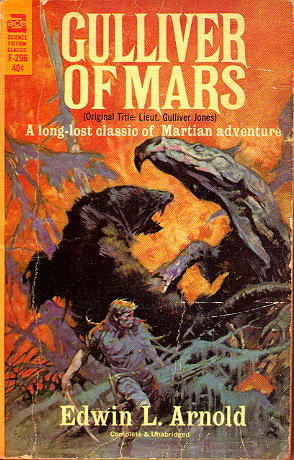Chapter X — Gulliver of Mars
byChapter X begins with a sense of quiet resolve as the protagonist journeys deeper into Martian territory, drawn by the mystery of its uncharted wilderness. His curiosity, tempered by the need to understand this world, pushes him forward through vivid landscapes unlike anything seen on Earth. Vegetation pulses with strange colors and movements, almost sentient in its reactions to the environment. Some plants shimmer with iridescent leaves, while others retract or hiss when disturbed, making it clear that beauty here does not guarantee safety. These peculiar features, while enchanting, suggest a constant tension between awe and danger, as if nature itself is observing him. As the forest deepens, the trail becomes harder to follow, yet he presses on, compelled by both instinct and purpose. Time seems to bend as he loses himself among the thick foliage, the lines between reality and illusion beginning to blur in the Martian undergrowth.
Emerging from the tangled greenery, he stumbles upon a tranquil fishing village set beside a serene bay. The contrast is immediate—where the forest was alive with unknowns, the village feels safe and still, grounded in simple rhythms of life. Here, he observes the locals crafting boats not from wood or metal, but by nurturing massive gourds, coaxing them into the right shapes over time. The process, both biological and artistic, seems at once ancient and futuristic, revealing the Martians’ deep connection to their environment. These boats are flawless in form, shaped without tools or joints, gliding over water as though born to it. The protagonist is struck by the idea that progress does not always mean force or conquest; here, it means patience, respect, and adaptation. Every detail—from their construction to the way they are used—reflects a people who do not command nature but live within its design.
As the evening settles, he shares meals with the villagers, each course built around seasonal ingredients prepared communally. Conversation flows without hierarchy, and laughter is shared freely, unaffected by suspicion or ambition. Their society, though simple in material terms, is rich in cohesion, where each individual’s joy and burden seem shared. Children learn by watching, not by compulsion, and elders lead by wisdom, not decree. This harmony disorients the protagonist, who is used to the busyness and structure of Earth. He begins to question whether complexity is always an improvement or if, somewhere along the way, humanity on Earth may have traded connection for progress. This realization sits heavily as he considers his next steps, unsure whether he has discovered a new world or rediscovered something forgotten.
As the night deepens, the gentle sounds of Martian life replace the silence of the forest, grounding the protagonist in a moment of rare stillness. He finds himself contemplating how cultures grow differently based on what they value—on Mars, simplicity has led to balance, not stagnation. The boats, the meals, the laughter all suggest a civilization content in its rhythm, not hungry for more but devoted to what it has. In contrast, Earth’s hunger often breeds dissatisfaction, chasing more without enjoying the present. The protagonist does not reject his origin, but the contrast opens his mind to new questions. What defines a civilization’s success—its reach, its knowledge, or its peace? His time in the village doesn’t provide answers, but it gifts him perspective, a new lens through which to view both Mars and Earth.
By morning, the forest path calls again, and the protagonist must continue his journey. He leaves with supplies and quiet farewells, feeling changed by the kindness of strangers and the lessons drawn from a world so different, yet strangely familiar. The gourd boats bob quietly behind him, silent reminders of nature’s patience and potential. In those final glances back, something intangible lingers—not just gratitude, but a seed of understanding that may only bloom when his journey ends. Mars, in its quiet way, teaches without preaching, revealing truths through experience rather than doctrine. As he walks away, the wind carries with it not just sand and scent, but questions that will shape the rest of his quest.

